A CRM can help you and your team manage and nurture your customers, but if you’re a small business or just starting out, the cost of new software can be a burden. Free CRMs are a great way to dive into the possibilities that this software offers without any commitments. You can test out the CRM tools you’re interested in to get a better idea of features worth the investment.
In this article, we’ll guide you through a list of the best free CRM platforms on the market, as well as some tips on what to look for in free software and why a complete solution like monday CRM makes for a great choice.
What is a free CRM?
Customer relationship management software, or CRM for short, is a solution that helps businesses of all sizes nurture leads and improve customer engagement. Whether to increase loyalty or convert more leads, CRM software can help you manage your customers in all stages of their journey.
There are plenty of free CRM options on the market, but free doesn’t always mean the software is a good fit for every team.
Who benefits from a free CRM
Free CRMs are often limited in their features and capabilities, making them hard to scale. Still, there are instances where a free CRM can be the right choice, for example:
- Independent workers looking to better manage leads and clients
- Home businesses or startups looking for a basic platform
- Companies looking for an independent platform to handle basic workflows
- Businesses with a very limited budget that need a simple CRM platform
Free CRM vs. free trial: A free CRM is truly free forever, though with feature or user limits. A free trial, on the other hand, offers full access for a limited time (usually 14–30 days) before requiring an upgrade.
Benefits and challenges of a free CRM
Not too long ago, CRM software would have been too expensive for the average small business owner. Today, CRMs come in all shapes and sizes, from mobile apps to robust platforms with extensive features.
Although some businesses may find it enticing to opt for a free system, there are benefits and drawbacks to these cost-free platforms. Let’s take a closer look.
Benefits of a free CRM
- Cost-effective: Probably the main advantage is that these platforms are ideal for small teams or startups with limited budgets
- Basic features: Free CRMs often include only the basic tools, which makes them straightforward and not too complex
- User-friendly: Free CRM solutions tend to be designed for easy setup and a minimal learning curve, making them appealing to users without extensive technical knowledge
- No long-term commitment: Businesses can test a CRM before upgrading or investing in a premium plan
Challenges of a free CRM
- Limited functionality: Advanced features like automations, analytics, and customizations aren’t available, which are often the features that help teams work more efficiently
- Storage constraints: Free software often only includes limited data storage, which can become an issue as your business grows and requires unlimited contacts, users, or file uploading
- User limits: Normally, free platforms set a limit on how many users can be onboarded, often as few as two or three, which can render them irrelevant if you have a few more members on your team
- Support challenges: Access to direct customer support, such as phone or email support, may be slower or even unavailable for users on a free plan
How small businesses benefit from a free CRM
Implementing free software can be tempting when your team has a limited budget. While free CRMs are often limited when it comes to more advanced features, small businesses in particular may find these free platforms particularly helpful. For small businesses, every dollar counts, so maximizing where teams spend their budgets can really help grow a company, especially in the early stages.
A free CRM allows small businesses to get their customer management organized with basic features so that sales and marketing teams can get initial data to make smarter choices that lead to increased revenue. That said, even with free software, it’s still important to make the right choice. Small businesses should look for a free CRM with flexible paid plans and simple scalability so that they can grow into it as their team’s needs increase.
Features to look for in a free CRM
When considering your options for free software, it’s important to understand that the features you can access will likely be limited. For a free CRM platform, you want to look for some basic capabilities that will make it easier for your team or business to manage leads and customers. Before settling on a free CRM, make sure it has at least these basic features:
- Contact management: Store, organize, and manage contacts, customers, and leads in one place.
- Pipeline visualization: Get an overview of leads in each sales stage for better deal management.
- Task management: Assign and track tasks for timely follow-ups and accountability.
- Email integration: Sync emails to streamline customer communications, email tracking, and customer interaction.
- Collaboration tools: Features like shared notes, chats, commenting, or file sharing can boost team productivity.
- Ease of use: Free tools should be simple to onboard and include intuitive interfaces that make it easy to manage tasks and collaborate.
Of course, CRMs have many other premium features like automation tools, AI assistants, customizable work views, security controls, and more, but these often require a paid plan. If you’re not sure whether you need a paid CRM or a free one, consider opting for a CRM with a free plan or free trial and testing it out to see if there are more functionalities that you could benefit from.
The top 10 free CRMs for your business
Choosing a free CRM may seem like less of a commitment than subscribing to a paid platform, but that doesn’t necessarily mean the decision-making process is quicker. It can be time-consuming to try out different free platforms to see which one best fits your workflow.
In the table below, you can see a side-by-side comparison of the best free CRM platforms. For more detailed reviews of each, keep scrolling.
| Platform | Use case | Free plan user limit | Starting price | User rating |
|---|---|---|---|---|
| monday CRM | Scalable and customizable AI CRM | Unlimited (Basic plan) | $12/user/month | 8.3/10 (TrustRadius) |
| Free HubSpot CRM | Free software to connect multiple HubSpot products | 2 users | $45/user/month | 8.4/10 (TrustRadius) |
| Zoho CRM | Feature-rich free CRM that's easy to use | 3 users | $14/user/month | 8.6/10 (TrustRadius) |
| ClickUp | Combined project management with CRM functionality | Unlimited | $7/user/month | 8.6/10 (TrustRadius) |
| Bitrix24 | All-in-one team collaboration platform | Unlimited | $49/month | 7.2/10 (TrustRadius) |
| Freshsales | AI-led CRM for pipeline growth | 2 users | $9/user/month | 8.4/10 (TrustRadius) |
| Agile CRM | All-in-one CRM for sales enablement | 10 users | $8.99/user/month | 9.2/10 (TrustRadius) |
| Capsule CRM | Simple, small business-focused CRM | 2 users | $18/user/month | 8.5/10 (TrustRadius) |
| Vtiger CRM | Open-source CRM with extensive customization options | 10 users | $12/user/month | 9.0/10 (TrustRadius) |
| Odoo CRM | Modular CRM for business growth | Unlimited | $13.50/user/month | 7.2/10 (TrustRadius) |
1. monday CRM
Use case: Scalable and customizable AI CRM
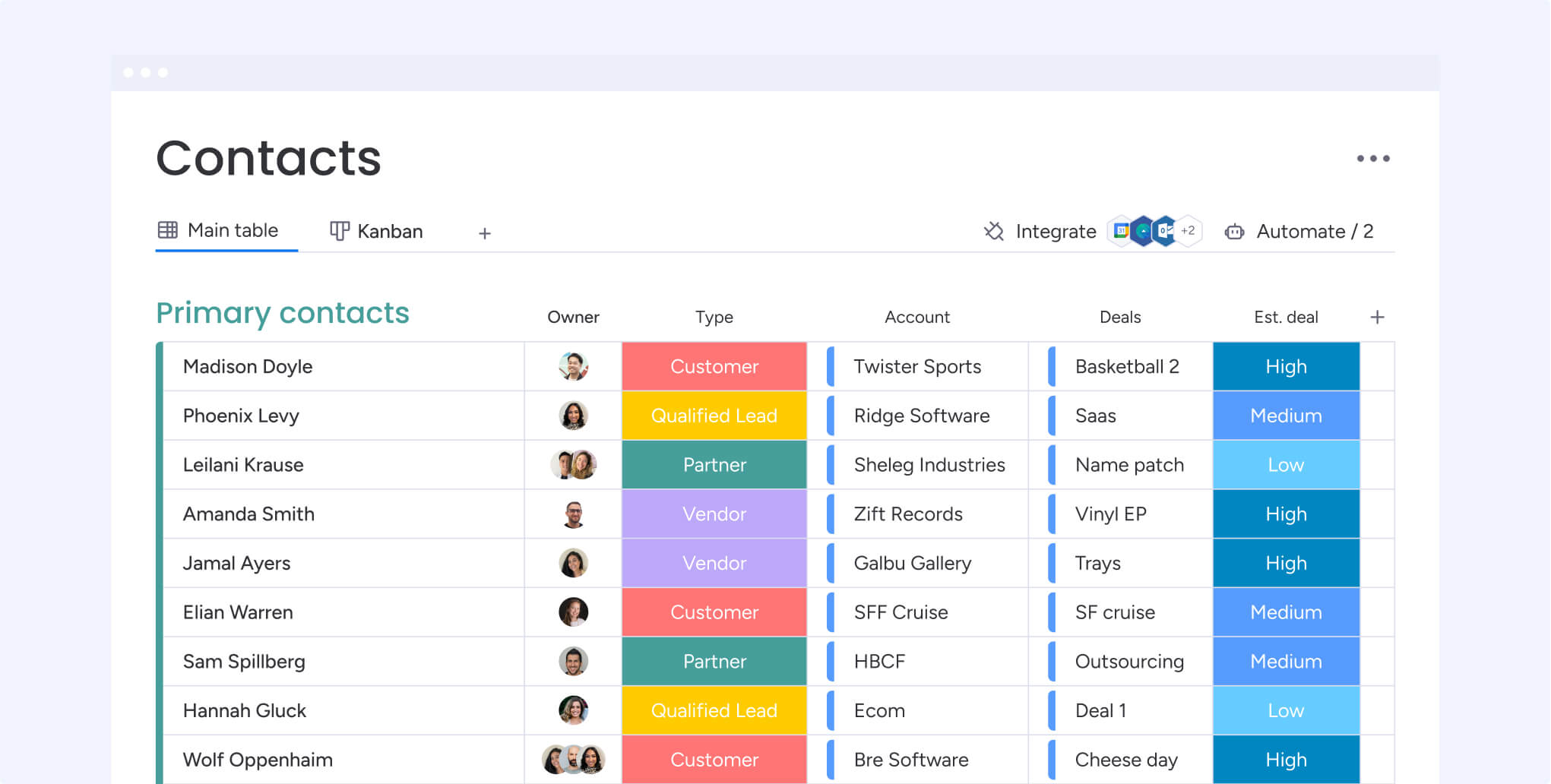
Combining a visually appealing interface with easy-to-use tools, monday CRM makes managing business relationships a breeze. The platform is perfect for small businesses or teams that require customization and a single platform with strong task management capabilities. While there isn’t a free forever plan, monday CRM’s flexible pricing makes it a feasible option for teams of any size.
Key features
- Simple drag-and-drop interface for intuitive and easy use
- Seamless integrations with other productivity tools like Slack, Google Workspace, Zoom, and 200+ other applications
- AI workflows for easy lead follow-up, reminders, and automation
Pricing
- Free 14-day trial
- Plans starting from $12/user/month
Learn more about monday CRM plans and pricing.
What users are saying
TrustRadius: 8.3/10
“At the price point offered, the monday CRM was by far the best option for our organization because we were already using it on the Work Management side. They made it super easy to integrate boards and dashboards on both sides. It has been really good at presenting our data in a clean and easy-to-digest manner.” — Laura Cable
Try monday CRM2. HubSpot CRM (free tools)
Use case: Software to connect multiple HubSpot products
HubSpot’s free marketing tools gives you access to core contact management and communication tools. It’s ideal for small teams that want an easy way to track contacts, send emails, and manage deals before investing in paid tiers.
While HubSpot Smart CRM’s paid plans (starting at $45/month) unlock deeper automation, AI features, and advanced reporting, the free plan provides an introduction to the HubSpot environment.
Key features
- Contact and deal management to organize and track up to 1,000 records
- Built-in email templates and tracking for consistent outreach
- Lead capture forms and live chat to convert website visitors into customers
Pricing
- Free forever plan (limited contacts and features)
- Paid HubSpot Smart CRM plans from $45/month
What users are saying
TrustRadius: 8.4/10
“HubSpot CRM is a great lead generation tool and lead contact aggregator. Browser-based, it lives online and is accessible remotely from any device. The lowest tier is also free – these factors combined makes it a viable tool for smaller businesses with a smaller sales team.” — Chris Niejadlik
Note: HubSpot’s free tools bundle — which includes Free Marketing, Sales, Service, Content, and Data tools — gives users access to basic CRM features like contact management, forms, and email tracking at no cost. The Smart CRM plan (starting at $45/month) builds on that foundation with advanced automation, AI capabilities, and deeper customization across all Hubs for teams that need more scalability and control.
3. Zoho CRM
Use case: Feature-rich free CRM that’s easy to use
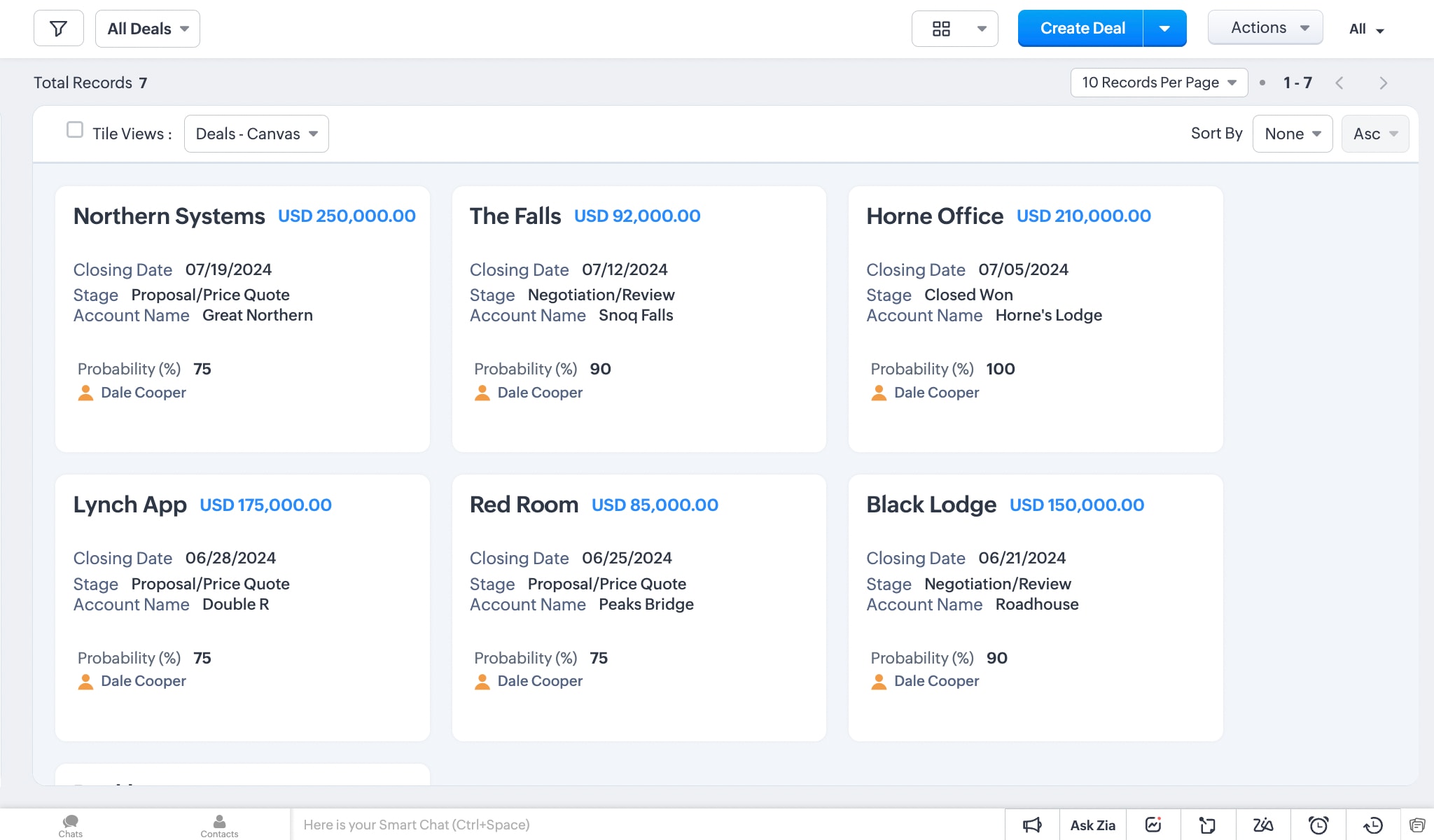
Zoho CRM is a versatile platform that offers a wide range of sales tools and features for sales, marketing, and customer service. Its free plan is well-suited for smaller teams, providing essential tools to create a basic customer experience without being overly complex.
Key features
- Lead management tools to track and nurture prospects
- Free cloud storage to create, organize, and share files and folders
- Workflow automations for up to 5 tasks to work more efficiently
Pricing
- Free forever plan for up to 3 users
- Plans starting from $14/user/month
What users are saying
TrustRadius: 8.6/10
“For a small business, Zoho is a great way to have a CRM that fits your budget. It is well worth it as it can be set-up to send reminders to your sales team to do follow-ups to quotes, which is important in getting contracts signed. Clients always love quick, accurate responses.” — Hillary Louarti
4. ClickUp
Use case: Combined project management with CRM functionality
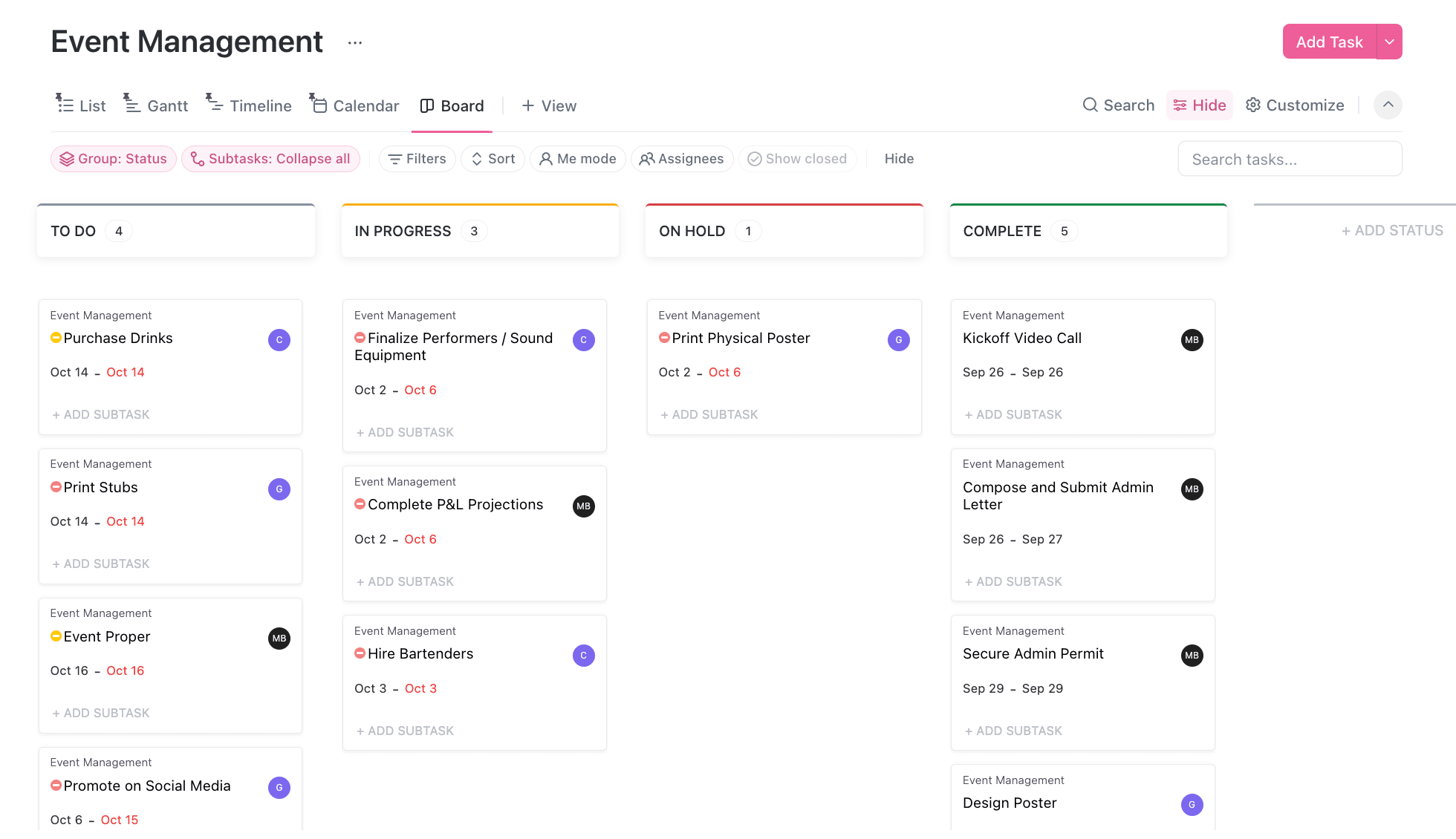
ClickUp is a flexible platform that blends task management with basic CRM features. It’s a great choice for teams that need a unified solution for managing customer relationships alongside internal projects. The free plan includes some basic customization options that make it suitable for small teams.
Key features
- Visual pipeline management to see the deals in your pipeline
- Multiple workviews, including Kanban boards and Calendar view
- Collaborative docs for teams to leave comments, updates, and easily work together
Pricing
- Free forever plan for unlimited users
- Plans starting from $7/user/month
What users are saying
TrustRadius: 8.6/10
“ClickUp is really easy to use, super customizable, and has greatly improved my company’s overall organization. Projects are a lot easier to plan out with their Gantt Charts feature, tickets are easy to update, and their automations feature allows for a lot of automatic updates that can be tedious to do by hand or even hard to remember to do every time.” — Maque Mathison
5. Bitrix24
Use case: All-in-one team collaboration platform
Bitrix24 provides a complete suite of CRM, communication, and project management tools. The platform’s free plan is packed with features, making it ideal for startups and small businesses on a tight budget. It also supports integrations and includes cloud-based storage.
Key features
- Custom contact management to organize lead and customer data
- Live chat that integrates with your website to engage leads and clients
- Collaboration tools such as sharing, commenting, and reacting
Pricing
- Free forever plan for unlimited users
- Plans starting from $99/month for up to 50 users
What users are saying
TrustRadius: 7.2/10
“Bitrix24 is highly beneficial for teams that are geographically dispersed or working remotely. Its real-time communication tools, including instant messaging and video conferencing, enable seamless collaboration regardless of physical location.” — Aman Kumar
6. Freshsales
Use case: AI-led CRM for pipeline growth
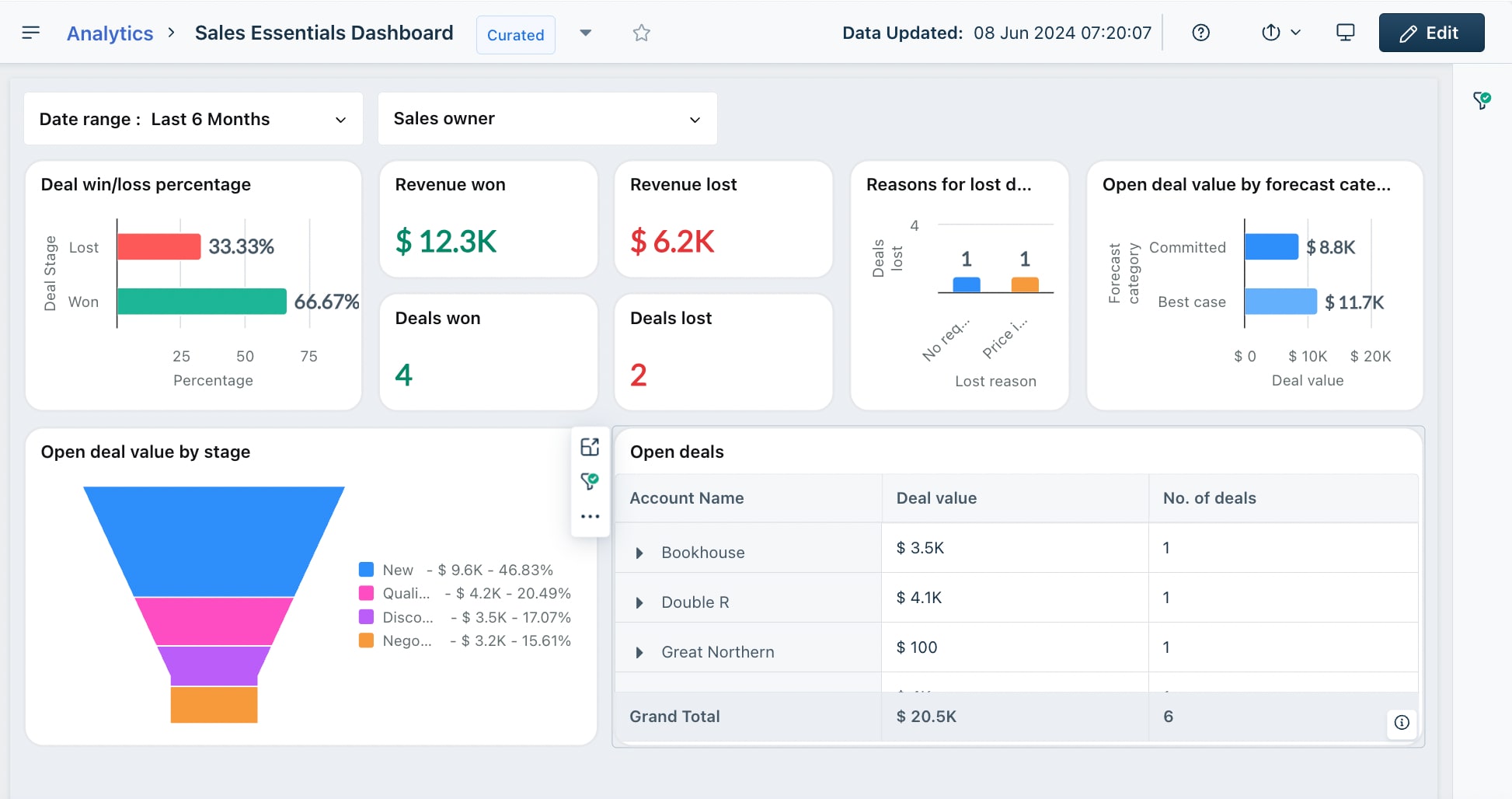
As a part of the Freshworks ecosystem of products, Freshsales is a CRM that offers comprehensive sales solutions. The platform includes email campaign support, expert prospecting tools, and AI capabilities designed to accelerate deal closure. With its intuitive interface and robust features, Freshsales helps teams focus on building better customer relationships.
Key features
- Built-in phone and live chat to engage with customers
- Email templates to keep sales teams aligned on messaging
- Freddy AI assistant for lead scoring, deal insights, and next-best-action recommendations
Pricing
- Free forever plan for up to 3 users
- Plans starting from $9/user/month
What users are saying
TrustRadius: 8.4/10
“We use Freshsales to track our organization Business Opportunities, leads as well ongoing engagements with our clients. Freshsales has become a critical part for our Business success, as we manage our new accounts and leverage add-ons/additional offering to the existing accounts.” — Verified user
7. Agile CRM
Use case: All-in-one CRM for sales enablement
Agile CRM combines sales, marketing, and service automation in a single platform. The solution offers an impressive range of features at competitive prices, including email campaigns, telephony, and helpdesk capabilities. Agile CRM is a good option for startups and small businesses looking for high-level functionality without a hefty price tag.
Key features
- Appointment scheduling enables leads and customers to book meetings independently
- Two-way telephony allows sales agents to make, receive, and record calls from the CRM
- Lead scoring helps teams rank prospects to qualify and prioritize high-value leads
Pricing
- Free forever plan for up to 10 users
- Plans starting from $8.99/user/month
What users are saying
TrustRadius: 9.2/10
“We currently use Agile CRM across the business to manage our customer and potential customer details. We also use the email templates and the campaigns to deliver our monthly and weekly updates to our subscribers as well as update all verified customers on important changes. The data syncs to our backend applications as well.” — Victoria Hoete-Dodd
8. Capsule CRM
Use case: Simple, small business-focused CRM
Capsule CRM emphasizes simplicity and relationship building with a clean, uncluttered interface that keeps the focus on people rather than processes. The CRM is targeted to small businesses that want to focus on productivity through improving customer interactions. Capsule CRM’s straightforward approach makes it easy to get started quickly and maintain consistent use.
Key features
- Email integrations with Outlook and Gmail to keep track of communication
- Sales pipeline helps track different sales stages and performance
- AI content assistant allows teams to create custom emails quickly
Pricing
- Free forever plan for up to 2 users
- Plans starting from $18/user/month
What users are saying
TrustRadius: 8.5/10
“My favorite feature of Capsule is the breadth and depth of integrations and functionality it offers. Our primary CRM, it’s a great place to find out what’s going on in the company. It has a simple interface that makes searching for profiles easy. We appreciate how well-designed it is.” — Farjana Labonno
9. Vtiger CRM
Use case: Open-source CRM with extensive customization options
Vtiger CRM offers a powerful open-source solution that provides flexibility and control for businesses with specific requirements. The platform combines sales, marketing, and support features with the ability to customize almost every aspect of the system. It’s ideal for tech-savvy teams or businesses that need unique, tailored workflows.
Key features
- Profile scoring to help track incoming leads and scores them for easy prioritization
- One View to help teams see all lead data in one place, such as quotes, deals, and documents
- Marketing automation that enables teams to build segments, landing pages, and email campaigns
Pricing
- Free forever plan, called One Pilot, for up to 10 users
- Plans starting from $12/user/month
What users are saying
TrustRadius: 9.0/10
“VTiger is used for our company’s CRM. I use Vtiger to pull product data and to match up product groups across the organization. I also input the keywords for other teams to use when setting up the products for retail. It’s the piece of collaborative software that holds all of our true, this-is-it source-of-truth product information.” — Ellen Evan
10. Odoo CRM
Use case: Modular CRM for business growth
Odoo CRM is part of a comprehensive suite of business apps, offering a unique modular approach where you can start with a CRM and seamlessly add other functions like accounting, inventory, or e-commerce as needed. Odoo CRM is ideal for businesses that want integrated systems without juggling multiple software providers, along with an open-source foundation.
Key features
- Visual pipeline to give teams an overview of current deals and sales stages
- Integrated communication tools for scheduling calls, demos, and emails
- Two-click quotations so teams can create official quotes from catalog items
Pricing
- Free forever plan for unlimited users for 1 app only
- Plans starting from $13.50/user/month (all apps included)
What users are saying
TrustRadius: 7.2/10
“We use Odoo CRM for our business needs and it has been one of the right choices we made. It helps us to track all our leads at one place and we can segregate our leads based on the pipeline. Follow-ups are very easy with Odoo and integrating it with our VOIP helped us to check the sales team performance effectively.” — Verified user
Get all the features and flexibility you need with monday CRM
There are some great free CRM options on this list, but as is the case with most software, the free versions just don’t stack up to what you can accomplish with a paid plan. Some platforms, like monday CRM, offer very affordable introductory plans that are great for small teams, giving you the flexibility to access the CRM features you need at a price point you’re comfortable with.
As part of the monday.com Work OS, monday CRM makes it easy for teams to build any type of workflow they need. Whether it’s building a custom pipeline to manage deals or handling daily tasks and customer-facing projects, monday CRM balances flexibility and a user-friendly interface with enough robust features to handle complex workflows and help your sales team scale as needed.
Here’s a closer look at the features that make monday CRM an excellent platform for growing teams.
Boost productivity with AI workflow automation
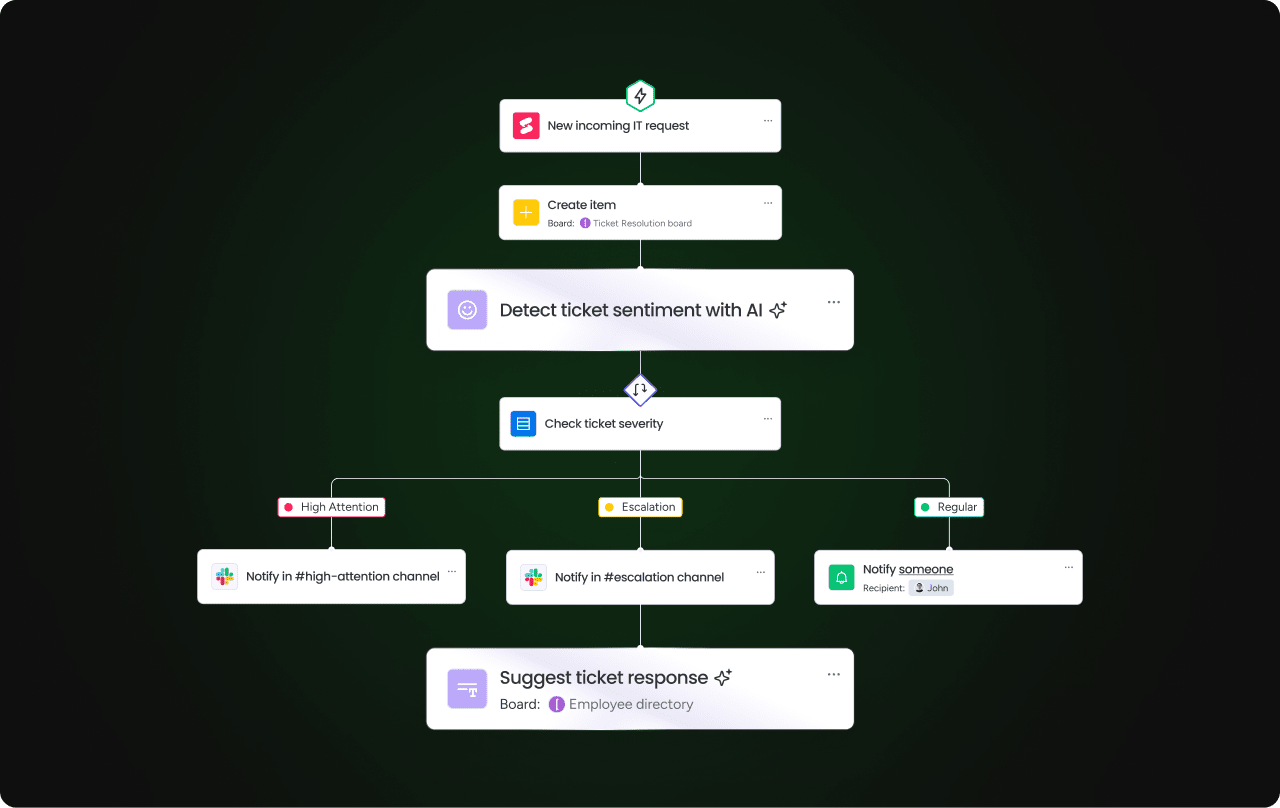
Most CRMs powered by AI don’t allow free users to access the AI and automation features that really make a difference in improving efficiency and lead management. With an AI CRM like monday CRM that offers tiered plans and flexible AI implementation options, teams can get all the benefits of AI automation, like follow-ups, sentiment analysis, and AI email writing, without breaking the bank.
Seamless collaboration between service, sales, and marketing teams

With monday CRM, you get more than just CRM software, but a platform for sales, marketing, customer support, and project management baked into one system. Sales agents can easily hand off customer accounts to service teams to solve issues and take over tickets, while marketing can use data gathered from sales efforts to inform future marketing campaigns.
Full platform customization to work your way
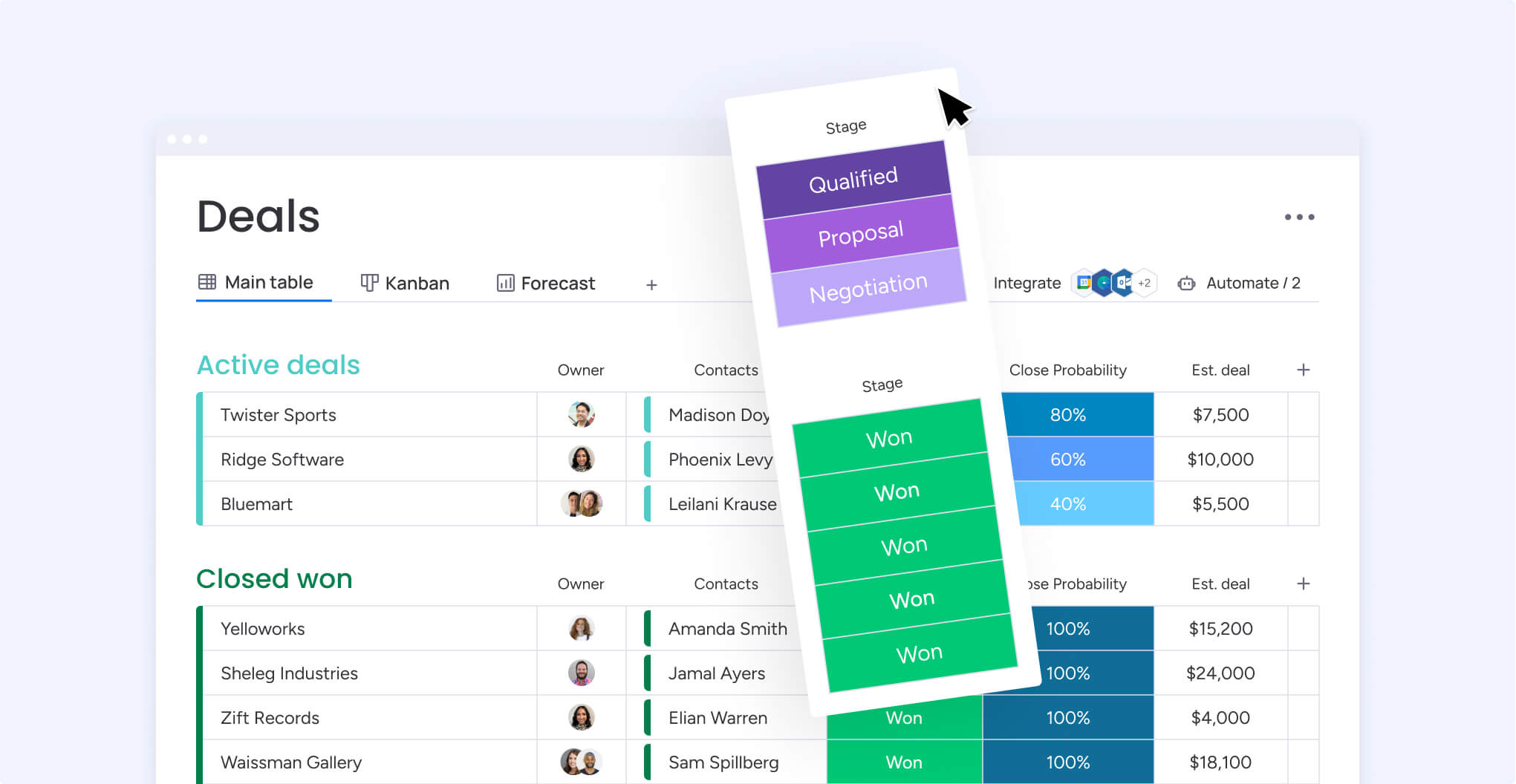
Build the CRM that works for you with customizable boards, automations, and workflows that complement both your work style and existing processes. Additionally, continue working with the tools you use most with integrations with over 200 apps, so that you can customize how and where data gets synced and workflows operate across multiple platforms.
Smart pipeline management to close more deals
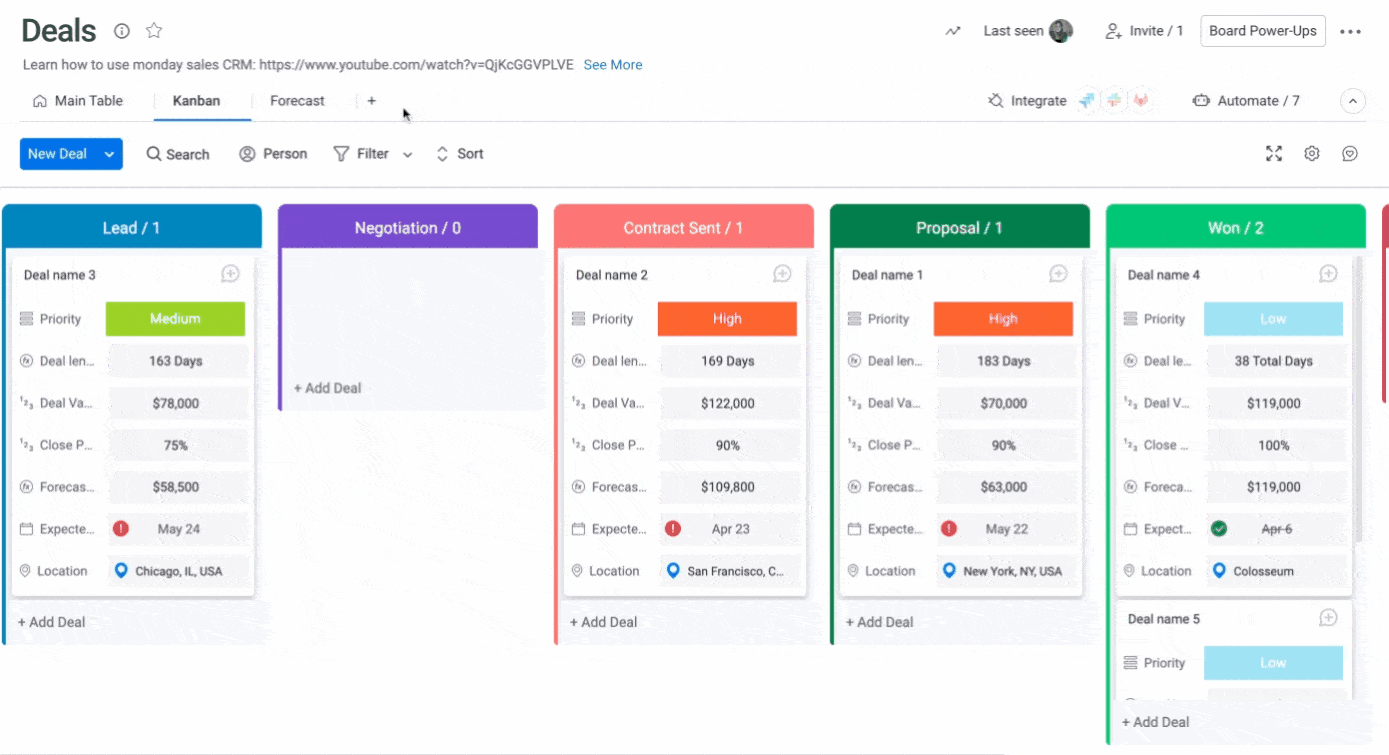
With a pipeline backed by AI, sales agents will find it simpler to quickly close deals with monday CRM. Visualize your pipeline in a unified view and implement AI automations to move deals through stages to avoid manual tasks that cause delays and roadblocks, allowing sales teams to focus more on high-value prospects and speed up deal closures.
Try monday CRMHow to choose the best free CRM for your business
With so many free CRM options available, selecting the right one for your business can feel overwhelming. The key is to focus on your specific needs and growth plans rather than getting distracted by flashy features you may never use. Here’s a practical checklist of questions to ask yourself to guide your decision:
- Does the free plan support your current team size, or will you quickly outgrow the user limits?
- Can the platform integrate with the tools you already use, such as your email provider, calendar, or marketing software?
- Is the interface intuitive enough that your team can start using it without extensive training?
- Does it offer the core features you need most, such as pipeline management, contact organization, or task automation?
- What limitations exist in the free version, and how soon might you need to upgrade?
- Is there a clear upgrade path if your business grows?
Getting started with your free CRM software: A 6 step guide
Once you’ve selected a free CRM that fits your needs, it’s time to set it up and get your team onboard. A smooth implementation can make the difference between a tool that transforms your workflow and one that goes unused.
Follow these 6 simple steps to get started:
- Sign up and configure settings: Create your account, set up user profiles, and adjust basics like time zones, currency, and notifications.
- Import existing data: Upload your contacts and leads from spreadsheets or other tools — most CRMs support easy CSV imports.
- Customize fields and pipelines: Match your CRM to your sales process by adding custom fields, deal stages, and pipelines.
- Connect essential integrations: Link your email, calendar, and other key tools to keep data synced and reduce manual work.
- Set up basic automations: Automate repetitive tasks like lead assignment, follow-up reminders, or deal status updates.
- Train your team: Run a short training session and outline clear data-entry guidelines to keep everything consistent.
Navigating limitations: Signs it’s time to upgrade from your free CRM
As your business grows, the limits of a free CRM can start to show. Recognizing those signs early helps you avoid bottlenecks and workflow headaches.
Watch for these red flags:
- Hitting storage or contact limits
- Maxing out automations or user seats
- Needing deeper reporting or analytics
- Spending extra time on manual workarounds
- Slower response times and missed follow-ups
- Struggling to customize fields or organize data
If these issues start to pile up, it’s probably time to upgrade to a paid plan — or move to a more flexible CRM that can scale with your team.
Get the most out of your free CRM
Whether you opt for a free trial or an entirely free CRM software, the most important thing is that you opt for a platform that can grow as your team evolves.
If you’re looking for a free CRM now because your team is small and your budget is tight, consider what your future business needs might be based on your goals and look for a platform that will grow with you, like monday CRM. With a scalable CRM, you can make sure your business is set up for success from day one so that you don’t need to switch to an entirely new platform down the line.
Try monday CRMFAQs
What is the best free CRM for a small business?
While monday CRM doesn't offer a free forever plan, it's an excellent choice for small businesses due to its intuitive drag-and-drop interface, powerful AI automations, and seamless integrations. The free 14-day trial lets you explore its capabilities, and the platform’s flexible plans offer great value for growing teams that are looking for customization and scalability.
What marketing features do free CRMs offer?
Marketing teams can make a lot of use of CRMs with features for email campaigns, lead capture forms, ad tracking, and reporting. Advanced features like marketing automation, however, are usually reserved for paid plans. Free CRMs may also include basic segmentation tools to target specific audiences, landing page builders for lead generation, and simple workflow automations for nurturing prospects through the sales funnel.
How does a free open-source CRM differ from a free cloud-based CRM?
Open-source CRMs require you to download, install, and host the software on your own servers, giving you complete control over customization and data but requiring technical expertise. Cloud-based CRMs are hosted by the provider and accessed through your browser, offering instant setup, automatic updates, and no maintenance requirements, though with less control over the underlying code.
How can sales professionals make the most of a free CRM?
Sales reps can make the most of a free CRM by keeping contact data updated, relying on pipeline tracking for deal management, and using automations and reminders to stay on top of follow-ups. Additionally, they can use email templates for consistent messaging, regularly review analytics to identify trends, and integrate their calendar and email tools to centralize communications.
Can a free CRM be customized to my specific business needs?
Yes, a free CRM can absolutely be customized, though customization levels vary by platform. Most free CRMs allow basic customization like adding custom fields, creating personalized pipelines, and configuring workflows. However, advanced customizations such as complex automations, custom integrations, or specialized reporting are often reserved for paid plans.


